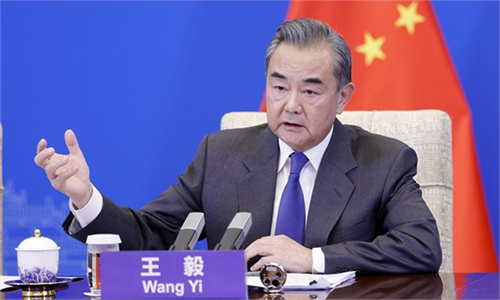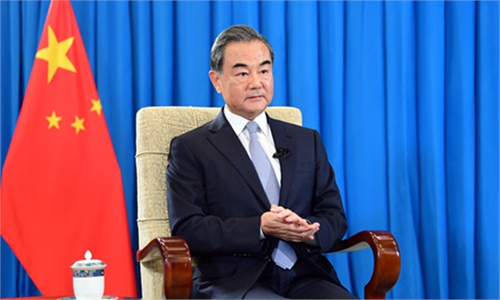Lancang-Mekong Cooperation built on mutual political trust, voluntary participation: Chinese Ambassador to Myanmar
China’s envoy to Myanmar calls for more efforts in the country’s democratic transition and national transformation
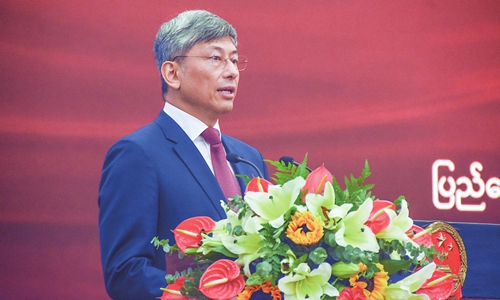
Chinese Ambassador to Myanmar Chen Hai Photo: Courtesy of Chinese Embassy in Myanmar
Editor's Note:
On July 4, the seventh Lancang-Mekong Cooperation (LMC) Foreign Ministers' Meeting was held in Bagan, Myanmar, Chinese State Councilor and Foreign Minister Wang Yi and Myanmar's Foreign Minister U WunnaMaungLwin co-chaired the meeting. At the meeting, Wang said, the LMC, as the first new sub-regional cooperation mechanism with the participation of the six countries in a basin, has developed rapidly and achieved remarkable results since its launch six years ago, successfully setting a golden example of regional cooperation.
In a recent exclusive interview with the Global Times' reporter Li Xuanmin (GT), Chinese Ambassador to Myanmar Chen Hai (Chen) also highlighted the successful implementation of LMC mechanism in contributing to regional peace, stability and prosperity. He stressed that the mechanism is based on political mutual trust, emphasized on voluntary participation without any political conditions attached.
In terms of deepening security cooperation among Mekong countries, Chen said China also encourages LMC to complement with the Global Security Initiative to promote regional peace and stability.
With regard to the situation in Myanmar which the world is following closely, Chen said political negotiation and reconciliation needs to be advanced, while more efforts are still needed for its democratic transition and national transformation. And China will continue to work with ASEAN to play a role in stabilizing and improving the situation in Myanmar.
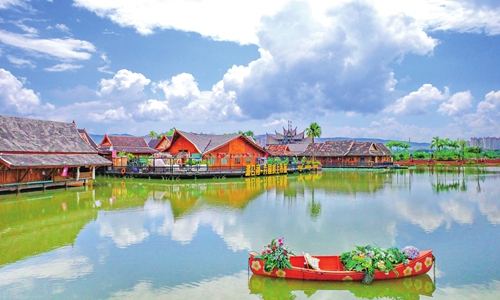
The Mekong River Six States Floating Market at Xishuangbanna Dai Autonomous Prefecture, Southwest China's Yunnan Province Photo: VCG
GT: LMC has become a model of sub-regional cooperation under the China-proposed BRI. In your view, why would the mechanism become an example of implementing multilateral cooperation and what are the reasons behind this?
Chen: Since the launch of LMC mechanism, the six countries have adhered to the original aspiration of "shared river, shared future" and pursued the concept of "development first, treat each other as equals, pragmatism and efficiency, openness and inclusiveness."
First, the LMC is built on political mutual trust and Mekong countries always treat each other with sincerity. The six countries have always promoted the idea of "equal treatment, sincerity and mutual assistance, and closeness as one family," fully taking care of each other and providing the maximum comforts in cooperation, without attaching any political conditions, and emphasizing voluntary participation.
China has established comprehensive strategic cooperative partnership with five Mekong countries. China and Myanmar, China and Laos, and China and Cambodia are building a community of shared future. And the six Lancang-Mekong countries are committed to building a Lancang-Mekong community with a shared future.
Second, the Lancang-Mekong Cooperation is people-centered. The six Lancang-Mekong countries are all developing countries, and they all reached the consensus that development should be the priority of regional cooperation, thereby forming the concept of "development first, pragmatism and efficiency, and project-oriented."
LMC does not function as "empty talk," but plays the role of a down-to-earth "bulldozer" that brought tangible benefits to the people in the region through "small yet beneficial" projects. The LMC special fund supported 666 projects in the fields of poverty alleviation, education, health, and women protection in Lancang-Mekong region, including 93 projects in Myanmar. For example, the "coffee production increase project" has trained more than 11,000 coffee farmers for Myanmar, helping double the output of local coffee beans.
Third, the continuous improvement of LMC mechanism has injected an inexhaustible impetus into cooperation. LMC has formed a multi-layer cooperation structure of "leadership taking the lead, all-round coverage, and participation of all departments." Even under the dual pressure of the raging epidemic and downward pressure on international economy, LMC has continued to develop in wider area and larger scope.
At the same time, LMC is inclusive, and it accommodates and supplements cooperation mechanism including China-ASEAN, Belt and Road Initiative and the Mekong River Commission to jointly promote regional peace, stability and prosperity.
GT: What is your view on the current situation in Myanmar, and what is China's stance and position?
Chen: The situation in Myanmar is overall stable but in some areas, local conflicts persist, and political negotiation and reconciliation needs to be advanced, and efforts are still needed for democratic transition and national transformation. As a friendly neighbor, we hope that Myanmar maintains stability, achieves peace and pursues development.
During the seventh LMC Foreign Ministers' Meeting, Chinese State Councilor and Foreign Minister Wang Yi met with Cambodian Deputy Prime Minister and Foreign Minister PrakSokhonn, expounding China's three expectations for resolving the Myanmar issue: to make joint efforts with ASEAN to push Myanmar in pursuit of continuous political reconciliation, to encourage Myanmar to restart the democratic transition process, and to expect ASEAN to remove distractions and constructively implement the "five-point consensus" of ASEAN.
Wang's remarks pointed out the direction for China and ASEAN to work together to promote the peaceful development of Myanmar and facilitate the overall solidarity of ASEAN. China will continue to work with ASEAN to play a role in stabilizing and improving the situation in Myanmar.
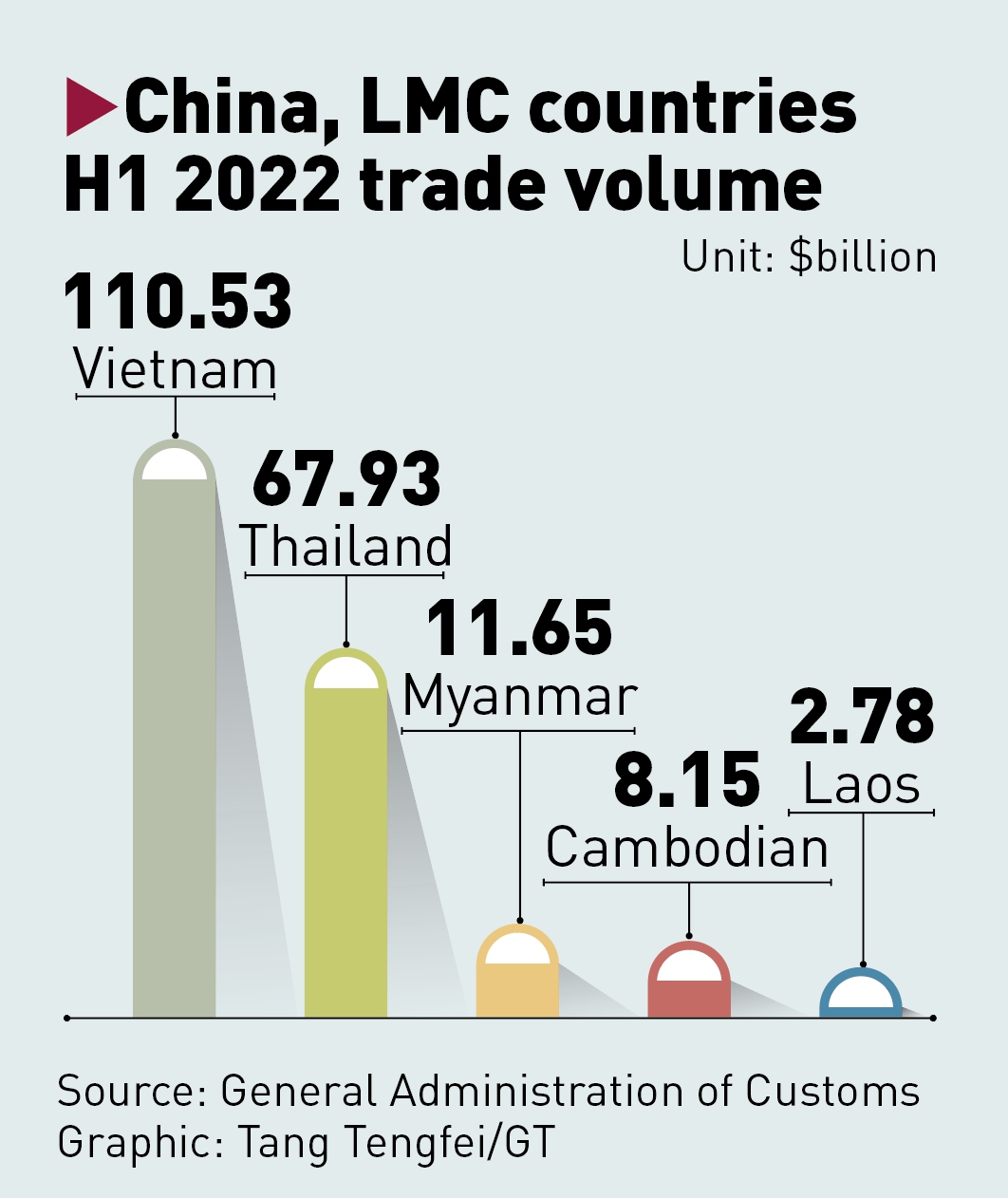
Graphic: Tang Tengfei/GT
GT: The seventh LMC Foreign Ministers' Meeting was held in Myanmar a few days ago, during which the Five-Year Plan of Action on the Lancang-Mekong Cooperation (2023-2027) was deliberated and endorsed. This year marks the opening of another "Golden Five Year" of the LMC, how do you evaluate the achievement of LMC in recent years, as well as the contributions of China and Myanmar in promoting regional cooperation?
Chen: The LMC is jointly initiated and promoted by the six countries including China and Myanmar. The LMC has made rapid progress and remarkable achievementsfor six years since its launch. It has successfully created a "golden example" for regional cooperation, contributed actively to promoting regional stability and prosperity, and brought tangible benefits for countries and people in the region.
China has provided support for LMC in terms of policies, funds, human resources. China has set up the special fund for LMC to support Mekong countries in carrying out economic, social and livelihood projects, and played an important role in the development of the region's economic development and regional integration.
Also, Myanmar is the first place where LMC is initiated, and is also an active participant, promoter and beneficiary of LMC. Since the country took over the co-chair of the LMC in August 2020, Myanmar has actively coordinated, promoted and participated in LMC.
In terms of development of LMC in recent years, first of all, LMC promotes high-quality regional connectivity, thereby providing a strong impetus for regional economic development. More than half a year since the official opening of the China-Laos Railway, nearly 800,000 tons of cross-border goods have been sent, covering more than 100 types of goods. The highway, airport, light rail and other projects undertaken by Chinese enterprises have effectively improved the infrastructure of the Mekong countries. In Myanmar, the China-funded deep-sea port project Kyaukphyu Port is also moving forward steadily.
Last year, the trade volume between China and the Mekong countries increased by 23 percent year-on-year, and in the first five months of this year, the trade volume grew 16 percent.
Secondly, the LMC has effectively improved the people's livelihood and well-being of the countries in the Mekong River Basin. Last year, China's imports of agricultural products from Mekong countries reached $17.4 billion, a year-on-year jump of nearly 33 percent.
The Myanmar project supported by the LMC special fund also focuses on less developed areas and the development of the country's agriculture sector - ranging from rice breeding to coffee planting, from food processing to agricultural technology exchanges. All are based on the needs of Myanmar people, and have effectively helped Myanmar's social and economic development, improved people's lives, and narrowed regional development gaps.
Amid the epidemic outbreak, LMC has effectively helped countries in their fights against epidemic. China has provided more than 200 million doses of vaccines to Mekong countries, sent medical expert teams, and aided the construction of nucleic acid testing laboratories and makeshift hospitals.
China also cooperated with Mekong countries to help enhance their testing capacity, drug research and development, and vaccine production, making full use of public health special fund of LMC. China also implemented traditional Chinese medicine (TCM) projects, and trained more than 1,300 TCM medical personnel and students for Mekong countries.
GT: At the meeting, six cooperation directions of LMC are mapped out, while the implementation of six plans is also announced. In your perspective, what is the prospect of LMC and how to deepen the cooperation mechanism in the region?
Chen: We believe under the joint efforts of six Mekong countries, LMC will usher in another more splendid "golden five years." And LMC will be built into a booster to achieve inclusive and sustainable development, and the six Mekong countries will become a shared community in defending sovereign equality and multilateralism.
In terms of security, the six countries will continue to adhere to the concept of common, comprehensive, cooperative and sustainable basis, and encourage the LMC and the Global Security Initiative (GSI) Chinese President Xi Jinping proposed to complement each other and jointly promote peace, stable and sustainable development of the region. Myanmar highly values GSI and is willing to actively participate in the initiative.
Expanding agricultural cooperation is one of the six major directions of LMC. All countries will jointly build a demonstration base for planting high-quality, safe agricultural products, and ensure supply of agricultural materials. China will also jointly promote the integration of Myanmar's agricultural exports standard with Chinese ones, and assist Myanmar in ensuring the supply of fertilizers and other agricultural materials.
LMC is born because of water. So the six countries will continue to promote the construction of the Lancang-Mekong water resources cooperation information sharing platform, and further strengthen cooperation on water resources management.
China has built a moderately prosperous society in an all-round way, and achieved victory in the battle against poverty. We are willing to deepen economic integration with the Mekong countries, and create a Lancang-Mekong market with common participation and universal benefits, and help Mekong countries reduce and eliminate poverty through cooperation plans on agriculture and digital economy.
The six Mekong countries will also continue to work together to respond to epidemic flare-ups, strengthen cooperation in epidemic prevention, and deepen cooperation in capacity building of medical personnel. China will also implement the "Lancang-Mekong Public Health Cooperation Plan," continuing to provide COVID-19 vaccines, strengthen cooperation in drug research and development, build TCM bases, and jointly build a public health system with Mekong countries.
GT: Chinese President Xi Jinping made a historical visit to Myanmar in 2020, and the two countries decided to build a China-Myanmar community with a shared future, ushering in a new era of bilateral relations. How have relations between the two countries evolved after the visit?
Chen: Since the visit, China and Myanmar have been working together to implement the consensus and results of the visit in political, economic, cultural and other fields. Despite the outbreak of the epidemic in Myanmar and the changes in the political situation, the two sides' positions to further implement the results of the visit have always been clear. China and Myanmar will continue to carry out cooperation in various fields, and promote the building of China-Myanmar community with a shared future.
The anti-epidemic cooperation is the most vivid manifestation of the China-Myanmar community with a shared future. Since the outbreak, China has provided Myanmar with 51 million doses of coronavirus vaccine, helping Myanmar to realize the local production of the vaccine. We also upheld the concept of "life first" and opened a green channel for epidemic prevention gear delivery in border areas, and the emergency medical gears have saved the lives of a large number of Myanmar people.
At present, the epidemic situation in Myanmar is generally stable, and new outbreaks remain relatively low among ASEAN members. China's vigorous assistance has played an important role in such situation.
Agriculture is closely related to Myanmar's national economy, as Myanmar's agricultural population accounts for 70 percent of its total population. China and Myanmar have closely cooperated in agricultural investment, product trade, technology cooperation, talent exchange, and rural poverty reduction.
While continuing to prevent and control the epidemic at the border, we have tried our best to smoothen China-Myanmar border trade and sea shipment, import more agricultural, livestock and aquatic products from Myanmar. We also actively promote the use of yuan in China-Myanmar border trade settlement to help Myanmar people increase their income.
Manufacturing is an important driving force for Myanmar's post-pandemic economic recovery. The garment manufacturing plant invested by China resumed production in the first time after epidemic eased in Myanmar, creating a large number of employment opportunities, especially in helping young women secure employment and stabilize family income.
China and Myanmar also actively promoted the construction of the China-Myanmar Economic Corridor, promoting cooperation in railways, highways, power grids, ports, and industrial zones, while also exploring cooperation in cross-border power grids construction and photovoltaic projects to help Myanmar ease power shortages.
All these cooperations have effectively improved the wellbeing of the people of the two countries and inherited the traditional "paukphaw friendship" of mutual assistance.


